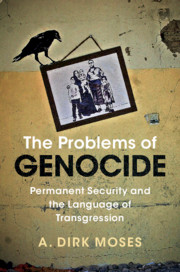Book contents
- The Problems of Genocide
- Human Rights in History
- The Problems of Genocide
- Copyright page
- Contents
- Preface
- Introduction
- Part I The Language of Transgression
- Part II Permanent Security
- 6 Permanent Security in History
- 7 The Nazi Empire as Illiberal Permanent Security
- 8 Human Rights, Population “Transfer,” and the Foundation of the Postwar Order
- 9 Imagining Nation-Security in South Asia and Palestine
- Part III The Language of Transgression, Permanent Security, and Holocaust Memory
- Index
8 - Human Rights, Population “Transfer,” and the Foundation of the Postwar Order
from Part II - Permanent Security
Published online by Cambridge University Press: 07 January 2021
- The Problems of Genocide
- Human Rights in History
- The Problems of Genocide
- Copyright page
- Contents
- Preface
- Introduction
- Part I The Language of Transgression
- Part II Permanent Security
- 6 Permanent Security in History
- 7 The Nazi Empire as Illiberal Permanent Security
- 8 Human Rights, Population “Transfer,” and the Foundation of the Postwar Order
- 9 Imagining Nation-Security in South Asia and Palestine
- Part III The Language of Transgression, Permanent Security, and Holocaust Memory
- Index
Summary
These demographic transformations caused by partitions and population “transfers” in Europe, the Middle East, and South Asia after 1945 were and remain foundational for the postwar order. The imperative to omit this foundational violence from legal proscription and moral purview informed the negotiation and ultimate formulation of each constituent element of the human rights revolution. These states set the threshold of what “shocks the conscience of mankind” to exclude liberal permanent security from legal proscriptions and moral condemnation. The language of transgression we use today narrowed and crystallized at this moment in global history. This chapter reconstructs how the notion of human rights developed as a function of liberal permanent security from the 1920s until the 1940s among British, Czechoslovak, and Zionist politicians and thinkers.
- Type
- Chapter
- Information
- The Problems of GenocidePermanent Security and the Language of Transgression, pp. 332 - 363Publisher: Cambridge University PressPrint publication year: 2021

